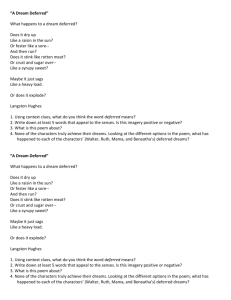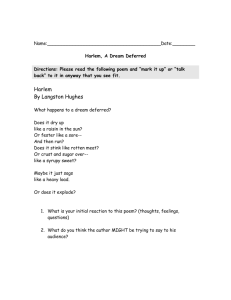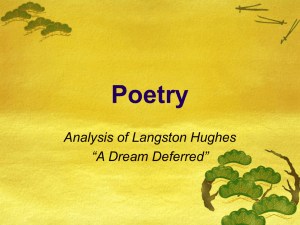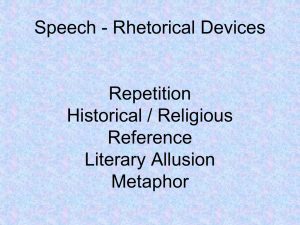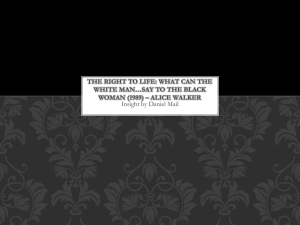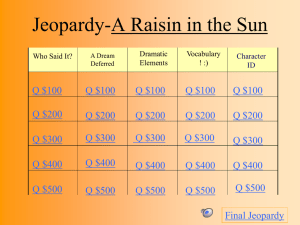Poetry Project Sample
advertisement
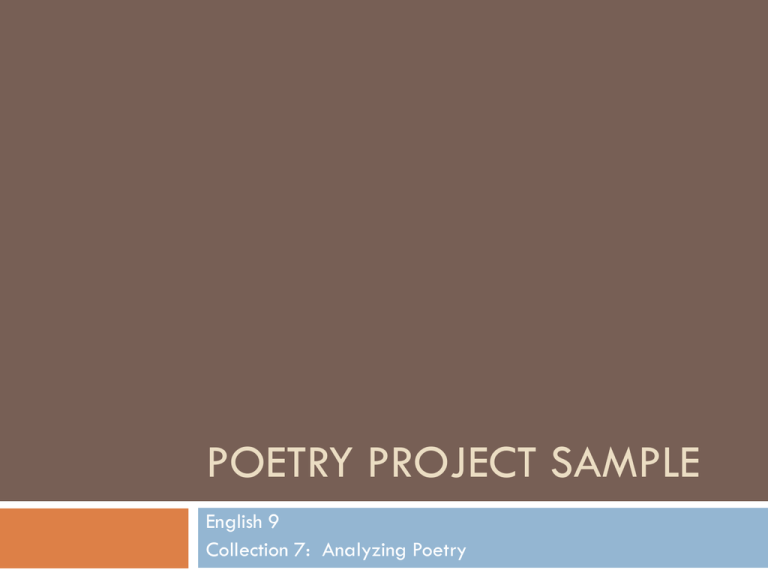
POETRY PROJECT SAMPLE English 9 Collection 7: Analyzing Poetry “Dream Deferred” by Langston Hughes What happens to a dream deferred? Does it dry up like a raisin in the sun? Or fester like a sore-And then run? Does it stink like rotten meat? Or crust and sugar over-like a syrupy sweet? Maybe it just sags like a heavy load. Or does it explode? Lines 1-3 What happens to a dream deferred? Dream = hope, aspiration for the future To Defer = to delay temporarily, to give in to someone else Hughes is asking what happens when people’s dreams or hopes are delayed or put on hold. Does it dry up like a raisin in the sun? SIMILE = the dream is being compared to a raisin in the sun The author is comparing deferred dreams to raisins in the sun because much like raisins in the sun, dreams are shriveled when put on hold or delayed. Lines 4-8 Or fester like a sore-And then run? SIMILE = the dream is being compared to a sore The author is comparing the deferred dream to a sore which has become diseased and infected. This creates the effect that these dreams are hard or painful to bring back to life. Does it stink like rotten meat? Or crust and sugar over-like a syrupy sweet? SIMILE = The dream is being compared to the smell of rotten meat The author is comparing the deferred dream to the horrid smell of rotten meat. This creates the effect that deferred dreams stink of decay. SIMILE = the dream is now being compared to sweet syrup. The author is comparing the dream in this comparison to something that is sickeningly sweet. Lines 9-11 Maybe it just sags like a heavy load. SIMILE = The dream is compared to a burden. The author is saying that deferred dreams can weigh the dreamer down. Or does it explode? METAPHOR = the deferred dream is compared to a bomb. This is effective because a bomb can go off and explode at any time just like a “dream deferred” Speaker/Subject The speaker of the poem can be described as someone who knows what it’s like to have dreams. This person also knows the feeling of putting his dreams on hold for whatever reason. He also understands the consequences of deferring one’s dreams. The subject of the poem deals with dreams and what happens when we don’t pursue them. Summary The poem discusses overall what happens to our dreams when we put them on hold. The speaker suggests that the consequences of deferred dreams are not always pleasant. At the end of the poem, the speaker compares deferred dreams to an explosion, which is a powerful image to convey the results of unpursued and forgotten dreams. Stylistic Devices “fester like a sore” “Stink like rotten meat” “Crust and sugar over” “syrupy sweet” “sags like a heavy load” All of the images/similes in the poem seem to say that if a dream is postponed, it can often become something terrible (theme) Rhyme and Rhythm Like a piece of jazz music, the poem uses rhyme and short bursts of rhythm. For example, “sun/run,” “meat/sweet,” and “load/explode”—pull the ideas behind the similes and metaphor together, repeating and building up the importance of the ideas like a series of notes repeated in music. Similarly, just as pauses in music provide dynamic rhythms, the lines in the poem have pauses between them, shown by the use of dashes and the skipped lines that set off the central section. The last important question of the poem, asked after a skipped-line pause, is like a final drumbeat that ends a piece of jazz music Tone The tone of the poem can be described as despairing. The following diction used in the poem helps to establish tone: “dry up” “fester” “sore” “stink” “rotten “sags” “heavy load” “explode” Theme The theme of “dream deferred” can best be stated as: Keeping people from achieving their dreams can have destructive consequences. Focus Questions 1. What does Hughes say will often happen when dreams are deferred/put on hold? 2. What are the dominant stylistic devices that Hughes uses to make his point in the poem? 3. What emotions are conveyed through Hughes’ poem? 4. What are the two possible meanings of the word “deferred” 5. What is the effect of the use of similes in the poem?
